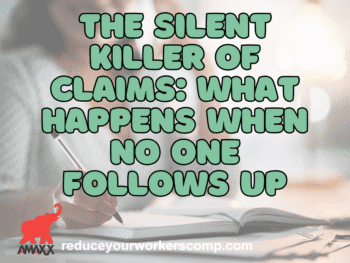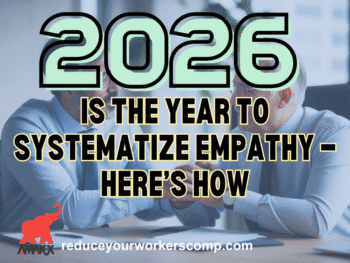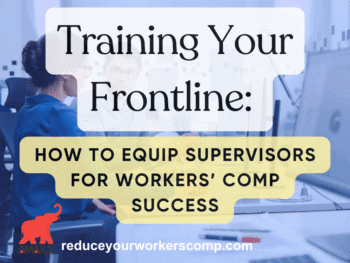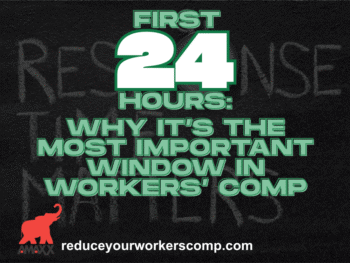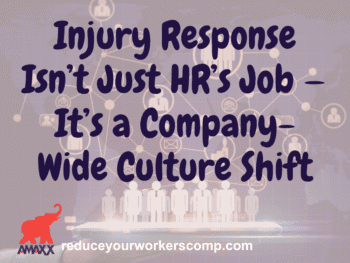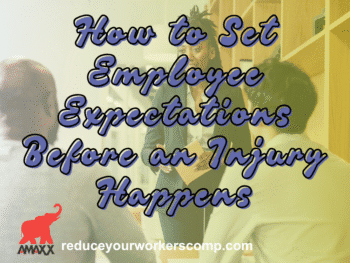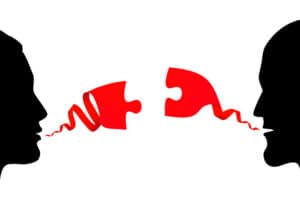
The dictionary defines rapport as a friendly relationship based on mutual liking, trust, and a sense that they understand and share each other’s concerns. One of the biggest mistakes employers make in handling their workers’ compensation claims is the failure to have rapport with the injured employee.
When an injury occurs to an employee, once the immediate medical treatment is obtained, the primary concern of the employee is how the injury will impact his/her job, his/her future income, and his/her ability to take care of their family obligations. The wise employer will have the workers’ compensation coordinator or employee’s direct supervisor in touch with the employee the same day as the accident to address the employee’s concerns about the future.
Click Link to Access Free PDF Download
“9-Element Blueprint To Create Your Workers’ Comp Employee Brochure”
Employee Needs Feedback and Positive Reinforcement
Following an accident, the employee needs both feedback from the employer and positive reinforcement that he/she will be taken care of by the employer. The work comp coordinator or supervisor should contact the employee to:
- inquiry with the employee about what the medical provider had to say,
- offer to arrange future medical care or diagnostic testing, if needed
- advise the claim has been reported to the insurer and the adjuster will be in touch within the next 24 hours
- reassure the employee that their job will be waiting for them when they are able to return to work
- advise the employee that the employer will do what is necessary to provide the employee with modified duty/light-duty work when the medical provider states it is okay to do so
- determine when the employee’s next medical appointment is
- ask the employee to call in following the next medical appointment to update his/her status
- ask the employee what the employer could do to prevent future accidents like the one the employee just had
- ask the employee if they have any questions or concerns about what will occur with their workers’ compensation claim
- by contacting the employee, preferably the same day, following an accident, and answering all of the employee’s questions, the employer shows the employee the employer is concerned about the employee’s wellbeing. When the employee is not contacted following the accident, the employee will feel ignored by the employer.
No Contact Leads to Worry and Often Legal Involvement
This will often lead to the employee hiring an attorney to answer the questions about the work comp claim the employer could have easily answered. The attorney will quickly express how the insurance company and the employer are out to take advantage of the employee, and, of course, the attorney can protect the employee from all of his/her concerns for a percentage of the claim. Often the attorney will even tell the employee that they will net more money after the attorney’s fee than they would without the attorney’s assistance. The worried employee will often be quick to latch on to these promises if they have do not have rapport with the employer and the employer’s reassurance that the employee will be taken care of.
The best way an employer can prevent an injured employee from obtaining an attorney and the unnecessary additional claim cost that drives the employer’s premiums higher, is to maintain contact with the employee after the accident. Not only is contact immediately after the accident needed, but contact with the employee following each medical visit will also work wonders in maintaining rapport and trust with the employee. By maintaining an active interest in the claim and the employee’s wellbeing, the claim will move forward in a positive manner.
Build Positive Momentum Through Return to Work Program
The return to work program, even if well established at your company, needs to be discussed and explained to the injured employee in terms of keeping his/her job available. The return to work program should be explained to the employee in terms of minimizing the income lost the employee will have due to receiving the lower disability benefit rather than the regular paycheck.
By maintaining contact with the injured employee, the employer will maintain rapport throughout the claim process. The positive atmosphere created by the rapport between the employee and the employer will lead to a more satisfying outcome of the claim for both the employee and the employer.
 Author Michael Stack, CEO Amaxx LLC. He is an expert in workers’ compensation cost containment systems and helps employers reduce their workers’ comp costs by 20% to 50%. He works as a consultant to large and mid-market clients, is a co-author of Your Ultimate Guide To Mastering Workers Comp Costs, a comprehensive step-by-step manual of cost containment strategies based on hands-on field experience, and is the founder & lead trainer of Amaxx Workers’ Comp Training Center, which offers the Certified Master of Workers’ Compensation national designation.
Author Michael Stack, CEO Amaxx LLC. He is an expert in workers’ compensation cost containment systems and helps employers reduce their workers’ comp costs by 20% to 50%. He works as a consultant to large and mid-market clients, is a co-author of Your Ultimate Guide To Mastering Workers Comp Costs, a comprehensive step-by-step manual of cost containment strategies based on hands-on field experience, and is the founder & lead trainer of Amaxx Workers’ Comp Training Center, which offers the Certified Master of Workers’ Compensation national designation.
Contact: mstack@reduceyourworkerscomp.com.
Workers’ Comp Roundup Blog: https://blog.reduceyourworkerscomp.com/
©2021 Amaxx LLC. All rights reserved under International Copyright Law.
Do not use this information without independent verification. All state laws vary. You should consult with your insurance broker, attorney, or qualified professional.

